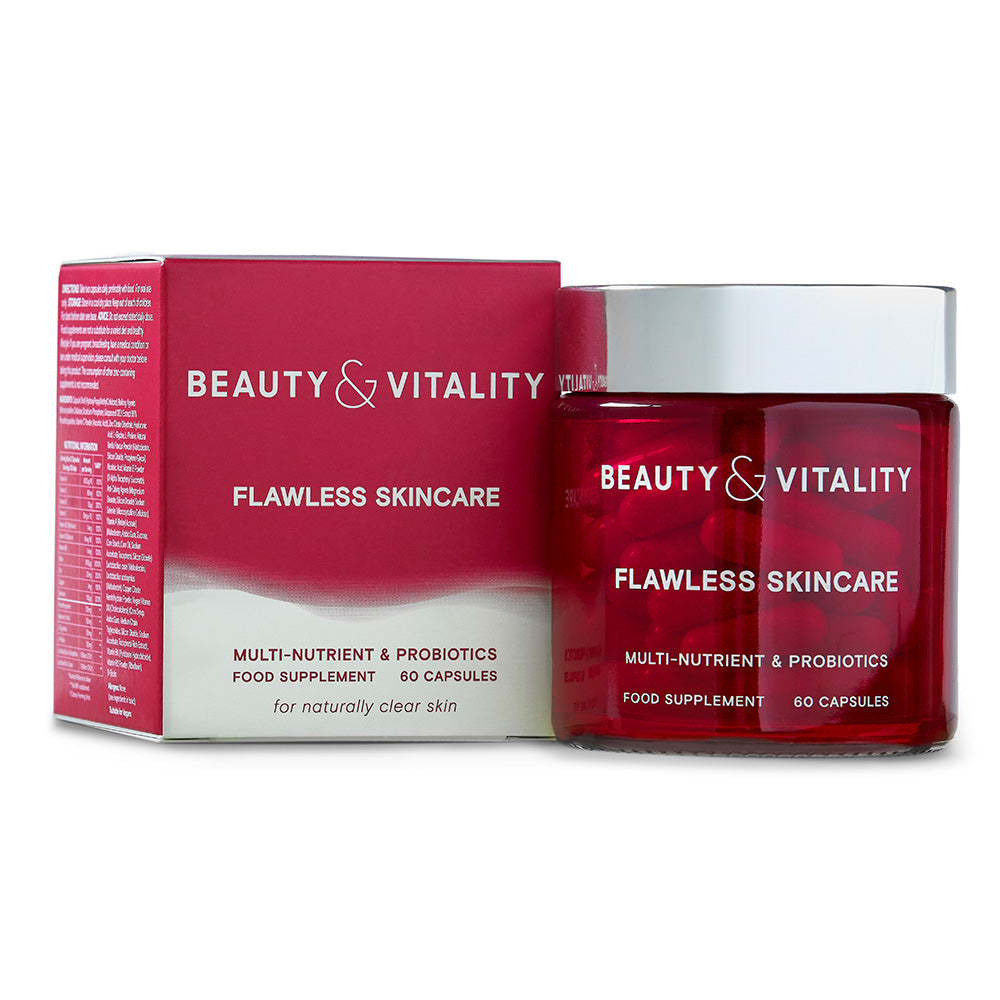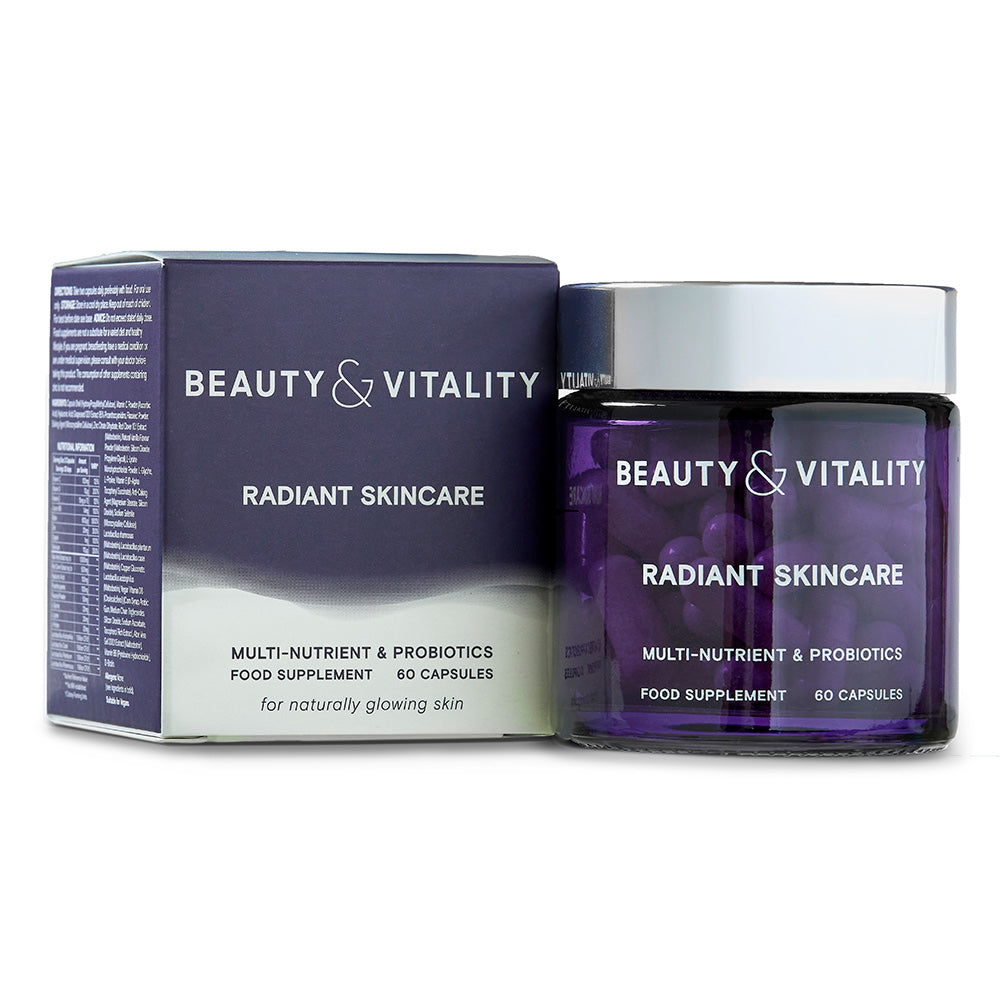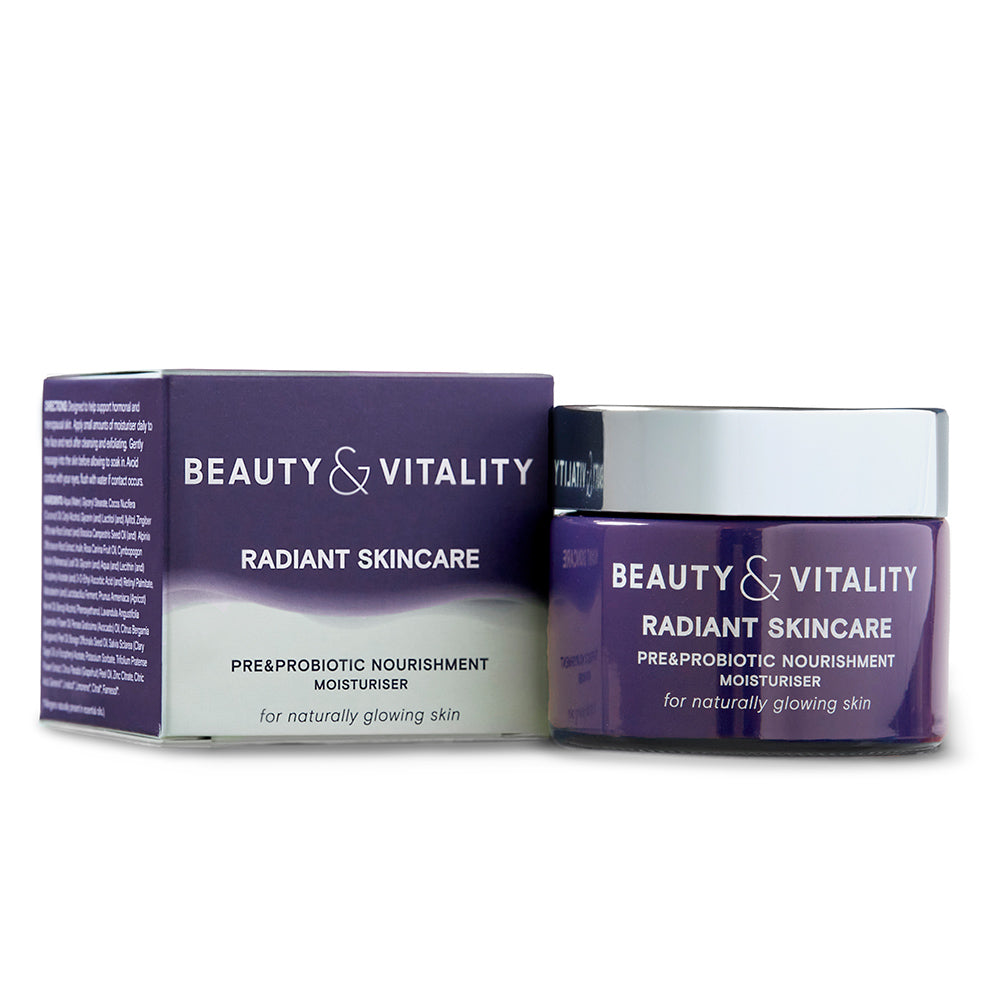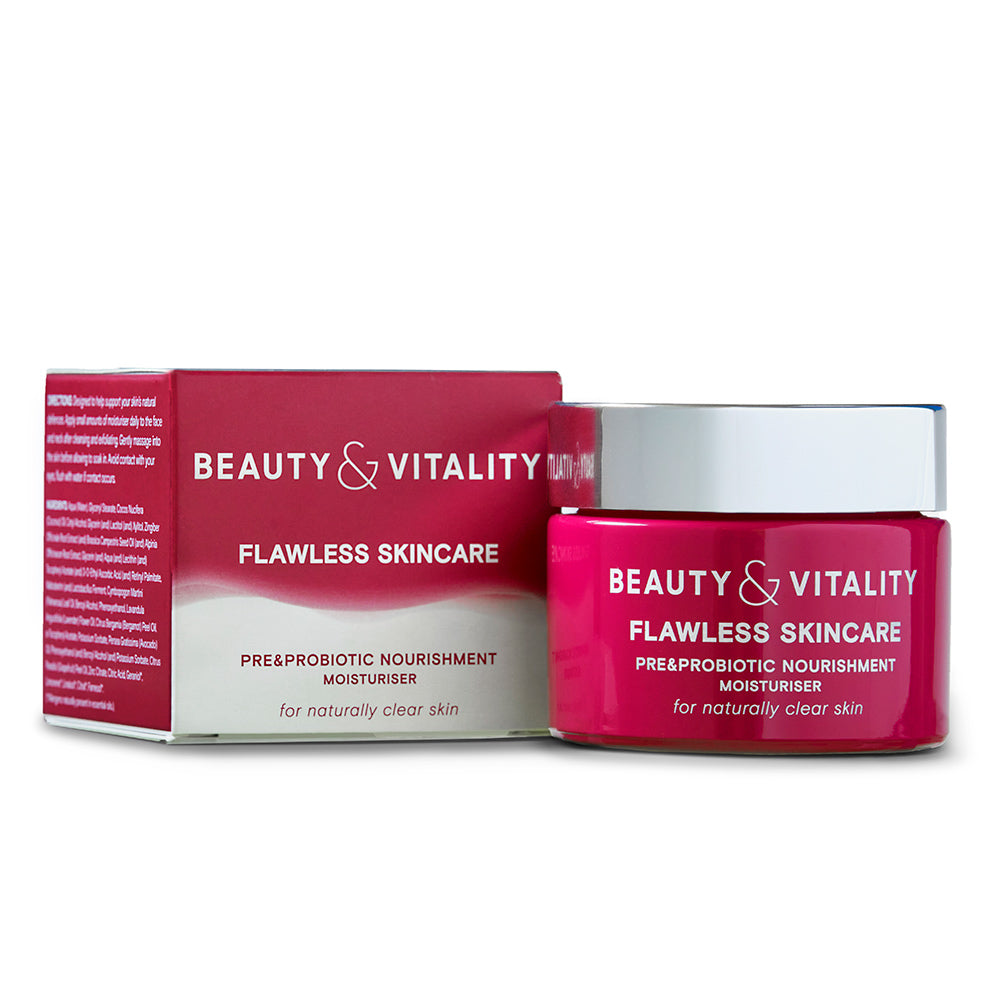
Factors that can accelerate skin ageing include sun damage, poor diet, smoking, excessive alcohol or caffeine, stress and your genes. A healthy whole-food diet with a variety of fruits & vegetables, drinking lots of water and eating healthy fats are great ways to support the skin against ageing.
Skincare specialist supplements, such as Beauty & Vitality can help maintain skin structure and help slow the signs of ageing.
What Causes Premature Ageing of the Skin?
Skin ageing is, of course, a natural process. However, premature skin ageing is a common concern for many people. The skin ageing process can be influenced and accelerated by various lifestyle and environmental factors.
These factors include:
- Sun Damage. Regular exposure to the sun’s UV rays is one of the primary causes of premature skin ageing. Sun damage leads to a breakdown or decrease in collagen and elastic production, resulting in the appearance of lines and wrinkles.
- A Poor Diet. A poor diet lacking in essential skin-supporting nutrients, healthy fats, vitamins and minerals (such as as zinc, iodine, vitamin C, vitamin A and B vitamins) are crucial for maintaining healthy skin. Processed and junk foods are often low in these naturally occurring nutrients, so relying on them as a regular part of your daily diet could take its toll in the long term. Processed foods and junk foods are also more likely to contain hydrogenated fats or refined vegetable oils that may contribute to increased free radical damage in the body.
- Skin Glycation. A diet high in sugar or carbohydrates with a high glycemic index (GI). Having high blood sugar levels caused by eating a lot of these foods may increase a process called glycation in the body. This is where sugars can attach to proteins – such as collagen in the skin – and damage them, accelerating ageing.
- Smoking. Smoking is one of the worst accelerators of skin ageing. It can cause lots of free radical damage in the body, and impair circulation, reducing nutrient delivery to the skin and removal of waste products.
- Excessive Alcohol and Caffeine Consumption. Both are dehydrating for the body, reducing its elasticity and plumpness which leads to premature ageing.
- Stress. Chronic stress can affect hormone levels, leading to premature skin ageing. Long-term stress, from either a high-stress job, family life or physical illness.
- Genetics. Unfortunately, some of us will show signs of age more quickly simply due to our genetics.
How to Prevent Premature Ageing Skin?
There are several key strategies to help combat premature skin ageing. These fall into three categories:
Diet & lifestyle
- Eat Whole Foods. A diet based on whole foods or ‘real’ foods is perhaps the most important factor. Whole foods consist of foods such as (unprocessed vegetables, fruit, meats, eggs, fish, nuts and seeds, beans and lentils.) These foods naturally provide the essential nutrients needed to support skin health and prevent premature ageing.
- Reduce Your Sugar Intake. Limiting your sugar intake not only helps balance your blood sugar levels, but reduces skin damage from glycation. By focusing on eating real foods, you should naturally reduce your intake of processed and sugary foods.
- Increase Your Healthy Fats. Good sources of healthy fats are oily fish (omega 3 fatty acids), avocados, olive oil, nuts and seeds that aren't roasted. Cold pressed seed oils, such as flaxseed oil, hemp seed oil and chia seed oil are particularly rich in healthy fats. These fats help maintain skin moisture, plumpness and elasticity.
-
Drink Plenty of Water. Increasing your water intake hydrates your skin. A good guideline for most people is 1.5 to 2 litres a day, although it can be less if you eat lots of vegetables or watery fruits; or more on a hot day or if you’re exercising. Herbal teas and soups can count towards this amount.
- Switch to Green Tea. Although green tea does contain some caffeine, it also has higher levels of antioxidants. Antioxidants are incredibly beneficial for skin health and have been linked with reducing glycation in the body.
-
Include a Natural Source of Collagen in your Diet. Collagen that we consume is broken down to supply the body with the amino acids it needs to build new collagen. Collagen is naturally found in the highest amounts in the parts of animals that we don’t usually eat: bones, cartilage, skin, tendons, and so on. For this reason, bone broth that is made in the traditional way by simmering animal bones (or an entire carcass, in the case of a chicken) for 12–24 hours can be the best way to get collagen. Collagen is also available in supplement form.
Skincare Supplements
- Vitamin C. Vitamin C is essential for collagen production, particularly those with bioflavonoids. Collagen is the main protein that gives strength and firmness to our skin. You can get more vitamin C from supplements or aim to have at least seven servings of vegetables or fruit a day. Orange vegetables and cooked tomatoes are particularly beneficial: they provide carotenoids which may help to reduce sun damage to the skin (but of course do not replace topical sun protection where necessary).
- Multi-Nutrient Supplements. ‘Skin hair nails’ combination supplements like the Radiant and Flawless range from Beauty & Vitality are the ideal choice for an easy everyday supplementation regime, providing a variety of nutrients that may support collagen and general skin health.
Multi-Nutrient Supplements from Beauty & Vitality

New Clean Formula Flawless Skincare Multi-Nutrient (60 tablets)

New Clean Formula Radiant Skincare Multi-Nutrient (60 tablets)
- Collagen. Collagen that we consume is broken down to supply the body with the amino acids it needs to build new collagen. Collagen is naturally found in the highest amounts in the parts of animals that we don’t usually eat: bones, cartilage, skin, tendons, and so on. For this reason, bone broth that is made traditionally by simmering animal bones (or an entire carcass, in the case of a chicken) for 12–24 hours can be the best way to get collagen. If you don’t fancy making bone broth, then you can take collagen in a supplement form to get some of the same benefits.
- Green Superfoods. Green ‘superfoods’ such as spirulina, chlorella, wheat grass or barley grass. Green ‘superfoods’ such as these can provide naturally occurring vitamins, minerals and antioxidants to nourish the skin. They may be particularly helpful if you struggle to eat enough vegetables and fruit (but should not be used to replace vegetables and fruit in your diet, of course).
- Vitamin D. It’s been found that having good vitamin D stores in our body may help protect against sun damage. This is a bit of a paradox because we also need sun exposure for our body to naturally get enough vitamin D. Sometimes a supplement can be the best option to maintain healthy levels.
-
Pycnogenol. Pycnogenol is also known as pine bark extract and helps support collagen production.
Aloe Vera. Aloe vera supplements support skin condition and elasticity. Choose a general-purpose aloe vera juice or capsule for best results. - Aloe Vera. Aloe vera supplements support skin condition and elasticity. Choose a general-purpose aloe vera juice or capsule for best results.
Skincare products
- Radiant Skincare Prebiotic & Probiotic Moisturiser. Designed to restore your skin’s natural radiance and glow, especially for women experiencing hormonal changes during peri- and menopause. This formula nourishes and strengthens the skin barrier, helping combat accelerated ageing.
- Flawless Skincare Prebiotic & Probiotic Moisturiser. Specifically targets breakout and blemish-prone skin by rebalancing your skin’s microbiome. It combines pre- and probiotics with essential vitamins and minerals, providing clearer skin. It also helps reduce inflammation associated with acne flare-ups. With regular use, the formula improves skin texture and strengthens the skin barrier, slowing down premature ageing.
Beauty & Vitality Skincare

Radiant Skincare Prebiotic & Probiotic Moisturiser (50ml)

Flawless Skincare Prebiotic & Probiotic Moisturiser (50ml)
Additional Tips to Help Prevent Skin Ageing
- Use Sun Protection. Always use sunscreen when going outdoors. Aim for a minimum of SPF 30 and regular application. For convenience and ease, look for an SPF mist or spray.
- Avoid Smoking. Quitting smoking can significantly improve your skin’s appearance and slow down the ageing process.
- Manage Stress. Look to incorporate stress-reducing activities, such as yoga, meditation or regular exercise into your daily routine. This will help your body remove cortisol, the hormone responsible for stress.
- Get More Sleep. Sleep and rest is crucial for supporting your skin health. Quality sleep not only improves your overall health but promotes skin regeneration.
Understanding exactly what accelerates skin ageing and how to prevent premature ageing is essential for maintaining youthful and radiant skin. By incorporating a healthier diet and lifestyle and consistently using the right skincare supplements or products, you can significantly reduce the signs of premature skin ageing. To learn more about the Beauty & Vitality skin regime, contact our team today or browse the range.
Safety
The information provided on this site is for educational purposes only and is not intended to diagnose or treat any medical condition. If you are taking any medications, have a diagnosed medical condition, or are pregnant or breastfeeding, please consult your doctor or health practitioner before taking supplements.
References
- Cho S et al. Dietary Aloe Vera Supplementation Improves Facial Wrinkles and Elasticity and It Increases the Type I Procollagen Gene Expression in Human Skin in vivo. Ann Dermatol. 2009 Feb;21(1):6-11.
- Grimm T et al. Inhibition of NF-kappaB activation and MMP-9 secretion by plasma of human volunteers after ingestion of maritime pine bark extract (Pycnogenol). J Inflamm (Lond). 2006 Jan 27;3:1.
- Rasheed Z et al. Green tea polyphenol epigallocatechin-3-gallate inhibits advanced glycation end product-induced expression of tumor necrosis factor-alpha and matrix metalloproteinase-13 in human chondrocytes. Arthritis Res Ther. 2009;11(3):R71.
- Tanaka M et al. Effects of plant sterols derived from Aloe vera gel on human dermal fibroblasts in vitro and on skin condition in Japanese women. Clin Cosmet Investig Dermatol. 2015 Feb 20;8:95-104.
